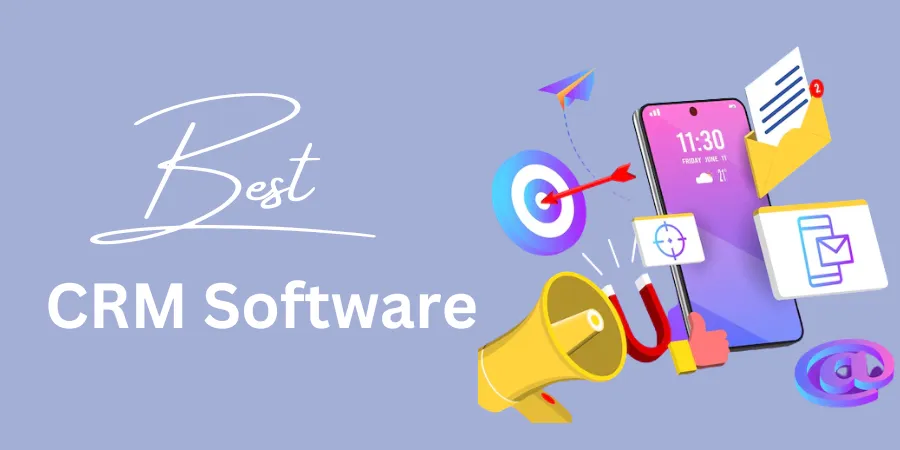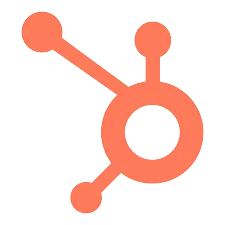13+ Best CRM Software [Reviewed and Ranked]
Customer relationship management (CRM) software is a powerful tool that helps businesses of all sizes manage their customer interactions and data throughout the customer lifecycle.
From small startups to large enterprises, a CRM system can help improve customer relationships, increase sales, and streamline business processes.
In this guide, we will review some of the best CRM software options available on the market today.
We will discuss the benefits of using CRM software, the pros and cons of each option, and how to get started with each one
Also, let’s answer some of the frequently asked questions about CRM software to help you make an informed decision when choosing the best CRM solution for your business.
What Is The Best CRM Software?
1. Salesforce CRM
Salesforce is a well-known and highly respected CRM software option that is used by businesses of all sizes.
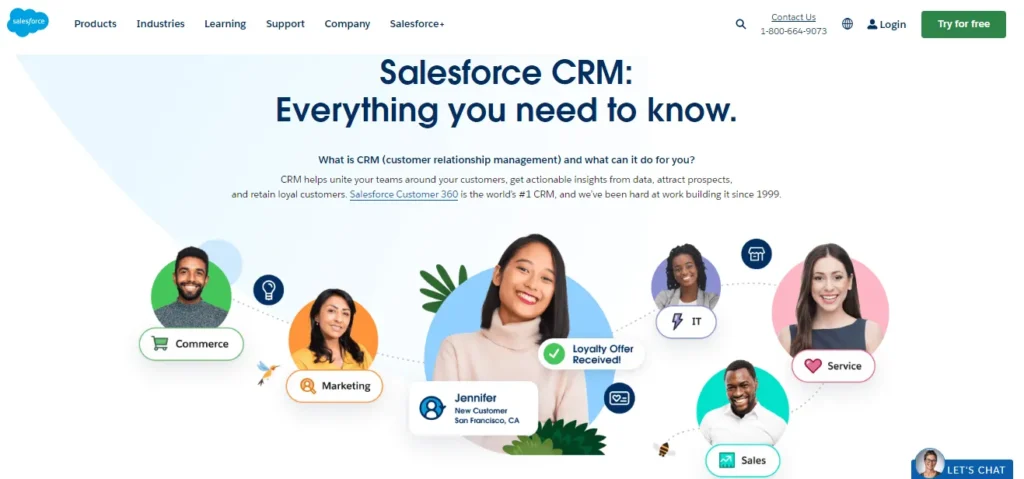
It offers a range of features and tools to help businesses manage their customer relationships, including contact and lead management, sales forecasting, and marketing automation.
Benefits of using Salesforce CRM
- Helps businesses manage customer relationships and interactions throughout the customer lifecycle.
- Offers a range of features and tools to help businesses improve sales and marketing efforts.
- Offers robust analytics and reporting capabilities to help businesses make informed decisions.
- Integrates with a wide range of third-party apps and tools.
Pros
- Wide range of features and tools.
- Highly customizable.
- Scalable to fit the needs of businesses of all sizes.
- Excellent customer support.
Cons
- Can be complex and overwhelming for small businesses or those new to CRM software.
- Pricing can be expensive, especially for larger businesses.
Getting started with Salesforce CRM
- Sign up for a free trial to get a feel for the platform and its features.
- Consider hiring a Salesforce consultant to help you set up and customize the software for your specific business needs.
- Take advantage of Salesforce’s extensive resources, including training materials, user guides, and customer support, to ensure a smooth implementation process.
2. HubSpot CRM
HubSpot is a popular CRM software option that is designed specifically for small and medium-sized businesses.
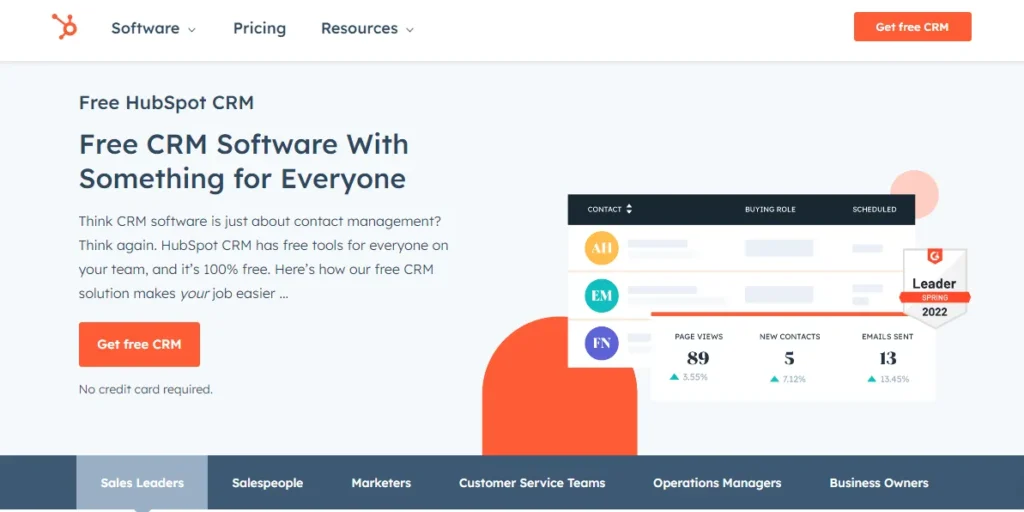
It offers a range of features and tools to help businesses manage their customer relationships, including contact and lead management, sales forecasting, and marketing automation.
Benefits of using HubSpot CRM
- Offers a range of features and tools to help businesses manage customer relationships and improve sales and marketing efforts.
- Offers robust analytics and reporting capabilities to help businesses make informed decisions.
- Integrates with a wide range of third-party apps and tools.
- Offers a free, basic version of the software that can be upgraded as needed.
Pros
- Affordable pricing options for small and medium-sized businesses.
- Intuitive and easy to use.
- Offers a free, basic version of the software.
- Excellent customer support.
Cons
- Limited in terms of advanced features and customization options compared to other CRM software options.
- May not be suitable for larger businesses with more complex needs.
Getting started with HubSpot CRM
- Sign up for a free trial to get a feel for the platform and its features.
- Consider hiring a HubSpot partner to help you set up and customize the software for your specific business needs.
- Take advantage of HubSpot’s extensive resources, including training materials, user guides, and customer support, to ensure a smooth implementation process.
3. Zoho CRM
Zoho CRM is a comprehensive CRM software option that is suitable for businesses of all sizes.
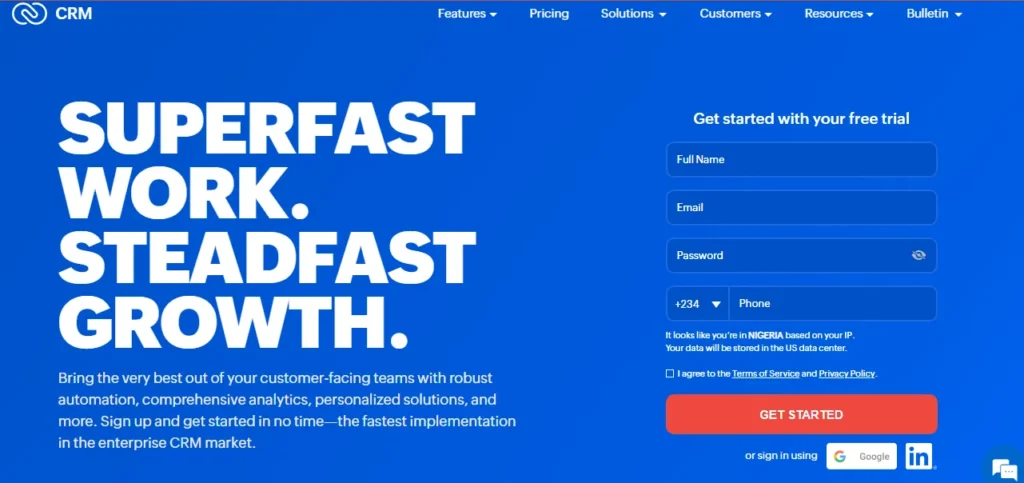
It offers a range of features and tools to help businesses manage their customer relationships, including contact and lead management, sales forecasting, and marketing automation.
It also offers integrations with a wide range of third-party apps and tools.
Benefits of using Zoho CRM
- Offers a range of features and tools to help businesses manage customer relationships and improve sales and marketing efforts.
- Offers robust analytics and reporting capabilities to help businesses make informed decisions.
- Integrates with a wide range of third-party apps and tools.
- Affordable pricing options for businesses of all sizes.
Pros
- Affordable pricing options.
- Wide range of features and customization options.
- Scalable to fit the needs of businesses of all sizes.
- Excellent customer support.
Cons
- Can be complex and overwhelming for small businesses or those new to CRM software.
- Some users may find the interface difficult to navigate.
Getting started with Zoho CRM
- Sign up for a free trial to get a feel for the platform and its features.
- Consider hiring a Zoho partner to help you set up and customize the software for your specific business needs.
- Take advantage of Zoho’s extensive resources, including training materials, user guides, and customer support, to ensure a smooth implementation process.
4. Microsoft Dynamics CRM
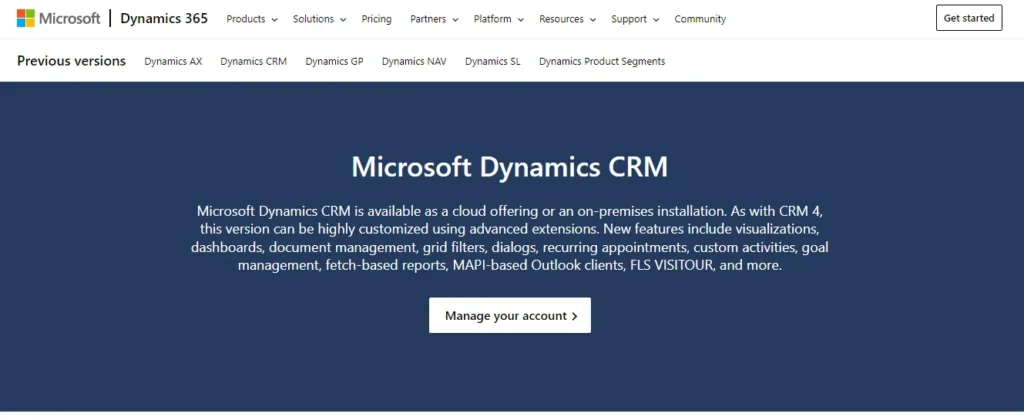
Microsoft Dynamics CRM is a comprehensive CRM software option that is suitable for businesses of all sizes.
It offers a range of features and tools to help businesses manage their customer relationships, including contact and lead management, sales forecasting, and marketing automation. It also integrates with a wide range of Microsoft products and other third-party apps and tools.
Benefits of using Microsoft Dynamics CRM
- Offers a range of features and tools to help businesses manage customer relationships and improve sales and marketing efforts.
- Integrates with a wide range of Microsoft products and other third-party apps and tools.
- Offers robust analytics and reporting capabilities to help businesses make informed decisions.
- Scalable to fit the needs of businesses of all sizes.
Pros
- Wide range of features and customization options.
- Integrates with a wide range of Microsoft products and other third-party apps and tools.
- Scalable to fit the needs of businesses of all sizes.
- Excellent customer support.
Cons
- Can be complex and overwhelming for small businesses or those new to CRM software.
- Pricing may be expensive for some businesses.
Getting started with Microsoft Dynamics CRM
- Sign up for a free trial to get a feel for the platform and its features.
- Consider hiring a Microsoft partner to help you set up and customize the software for your specific business needs.
- Take advantage of Microsoft’s extensive resources, including training materials, user guides, and customer support, to ensure a smooth implementation process.
5. Monday Sales CRM
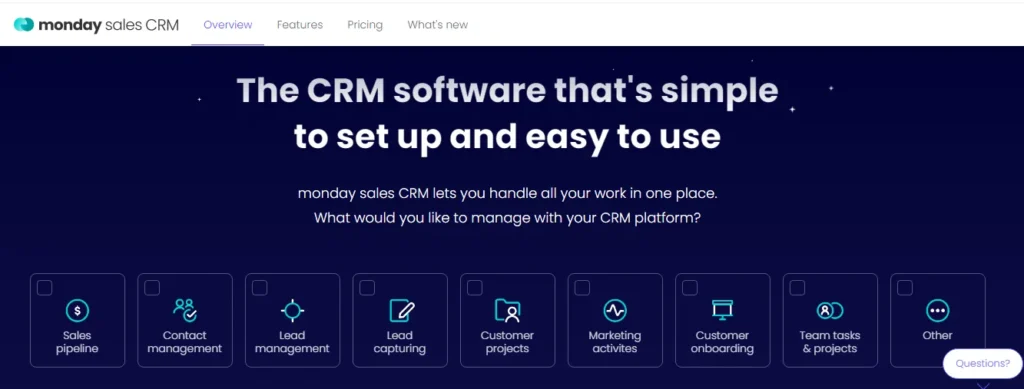
Monday Sales CRM is a CRM software option that is designed specifically for small businesses.
It offers a range of features and tools to help businesses manage their customer relationships, including contact and lead management, sales forecasting, and marketing automation.
Benefits of using Monday Sales CRM
- Offers a range of features and tools to help businesses manage customer relationships and improve sales and marketing efforts.
- Affordable pricing options for small businesses.
- Easy to use and navigate.
Pros
- Affordable pricing options for small businesses.
- Intuitive and easy to use.
- Offers a range of features and tools to help businesses manage customer relationships and improve sales and marketing efforts.
Cons
- Limited in terms of advanced features and customization options compared to other CRM software options.
- May not be suitable for larger businesses with more complex needs.
Getting started with Monday Sales CRM
- Sign up for a free trial to get a feel for the platform and its features.
- Take advantage of Monday Sales CRM’s resources, including training materials and customer support, to ensure a smooth implementation process.
6. Pipedrive
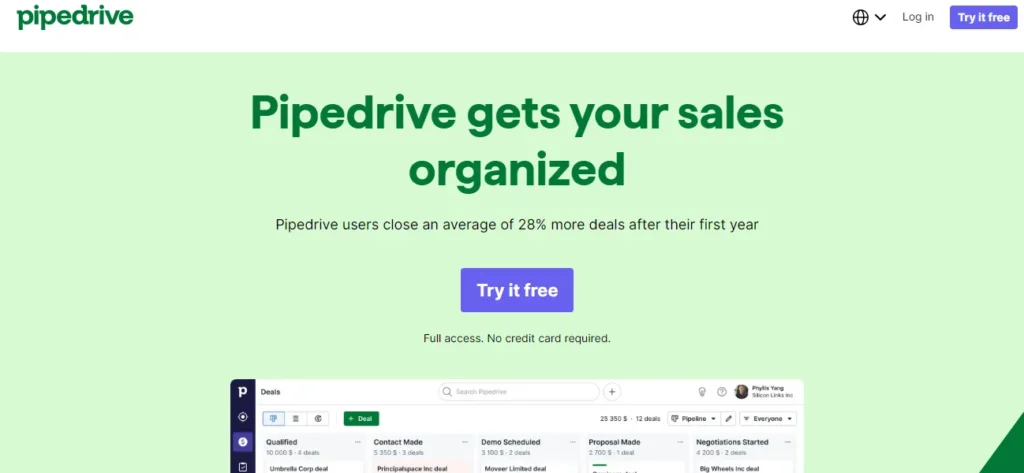
Pipedrive is a CRM software option that is designed specifically for small and medium-sized businesses.
It offers a range of features and tools to help businesses manage their customer relationships, including contact and lead management, sales forecasting, and marketing automation.
Benefits of using Pipedrive
- Offers a range of features and tools to help businesses manage customer relationships and improve sales and marketing efforts.
- Affordable pricing options for small and medium-sized businesses.
- Easy to use and navigate.
Pros
- Affordable pricing options for small and medium-sized businesses.
- Intuitive and easy to use.
- Offers a range of features and tools to help businesses manage customer relationships and improve sales and marketing efforts.
Cons
- Limited in terms of advanced features and customization options compared to other CRM software options.
- May not be suitable for larger businesses with more complex needs.
Getting started with Pipedrive
- Sign up for a free trial to get a feel for the platform and its features.
- Consider hiring a Pipedrive partner to help you set up and customize the software for your specific business needs.
- Take advantage of Pipedrive’s resources, including training materials and customer support, to ensure a smooth implementation process.
7. Zendesk
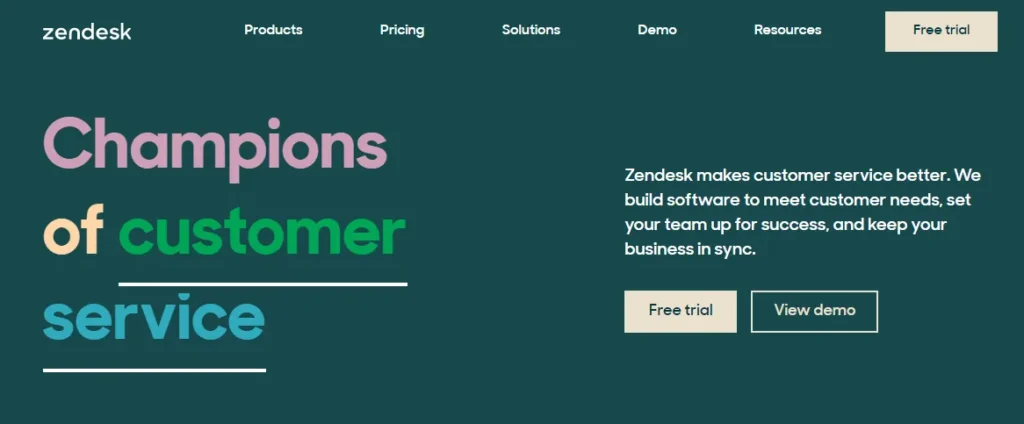
Zendesk is a customer service and support platform that offers CRM capabilities.
It offers a range of features and tools to help businesses manage customer inquiries and support requests, including ticketing and tracking, live chat, and knowledge management.
Benefits of using Zendesk
- Offers a range of features and tools to help businesses manage customer inquiries and support requests.
- Integrates with a wide range of third-party apps and tools.
- Offers robust analytics and reporting capabilities to help businesses track and improve customer satisfaction.
Pros
- Wide range of features and tools to help businesses manage customer support.
- Integrates with a wide range of third-party apps and tools.
- Offers robust analytics and reporting capabilities.
Cons
- May not be suitable for businesses looking for more comprehensive CRM capabilities, such as sales and marketing automation.
- Pricing may be expensive for some businesses.
Getting started with Zendesk
- Sign up for a free trial to get a feel for the platform and its features.
- Consider hiring a Zendesk partner to help you set up and customize the software for your specific business needs.
Take advantage of Zendesk’s extensive resources, including training materials, user guides, and customer support, to ensure a smooth implementation process
8. Oracle NetSuite CRM
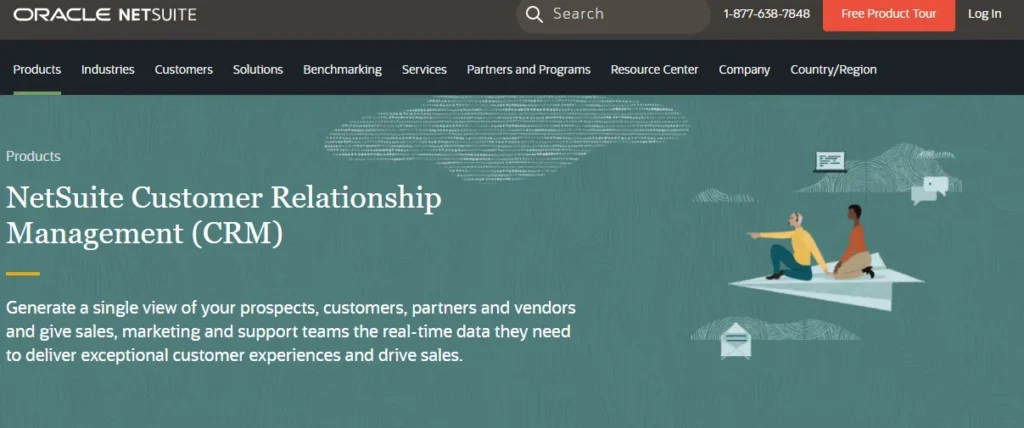
Oracle NetSuite CRM is a comprehensive CRM software option that is suitable for businesses of all sizes.
It offers a range of features and tools to help businesses manage their customer relationships, including contact and lead management, sales forecasting, and marketing automation. It also offers integrations with a wide range of third-party apps and tools.
Benefits of using Oracle NetSuite CRM
- Offers a range of features and tools to help businesses manage customer relationships and improve sales and marketing efforts.
- Integrates with a wide range of third-party apps and tools.
- Offers robust analytics and reporting capabilities to help businesses make informed decisions.
- Scalable to fit the needs of businesses of all sizes.
Pros
- Wide range of features and customization options.
- Integrates with a wide range of third-party apps and tools.
- Scalable to fit the needs of businesses of all sizes.
- Excellent customer support.
Cons
- Can be complex and overwhelming for small businesses or those new to CRM software.
- Pricing may be expensive for some businesses.
Getting started with Oracle NetSuite CRM
- Sign up for a free trial to get a feel for the platform and its features.
- Consider hiring an Oracle NetSuite partner to help you set up and customize the software for your specific business needs.
- Take advantage of Oracle NetSuite’s extensive resources, including training materials, user guides, and customer support, to ensure a smooth implementation process.
9. Keap
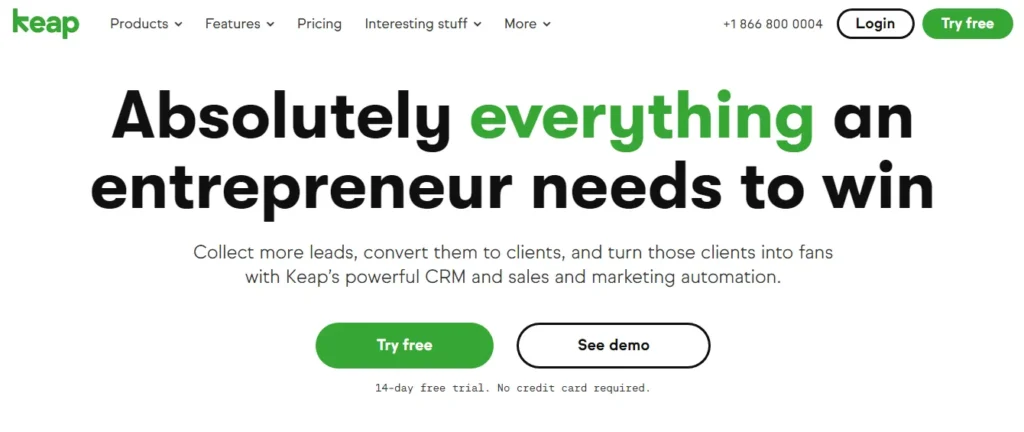
Keap is a CRM software option that is designed specifically for small and medium-sized businesses.
It offers a range of features and tools to help businesses manage their customer relationships, including contact and lead management, sales forecasting, and marketing automation.
Benefits of using Keap
- Offers a range of features and tools to help businesses manage customer relationships and improve sales and marketing efforts.
- Affordable pricing options for small and medium-sized businesses.
- Easy to use and navigate.
Pros
- * Affordable pricing options for small and medium-sized businesses.
- * Intuitive and easy to use.
- * Offers a range of features and tools to help businesses manage customer relationships and improve sales and marketing efforts.
Cons
- Limited in terms of advanced features and customization options compared to other CRM software options.
- May not be suitable for larger businesses with more complex needs.
Getting started with Keap
- Sign up for a free trial to get a feel for the platform and its features.
- Consider hiring a Keap partner to help you set up and customize the software for your specific business needs.
- Take advantage of Keap’s resources, including training materials and customer support, to ensure a smooth implementation process.
10. Freshsales
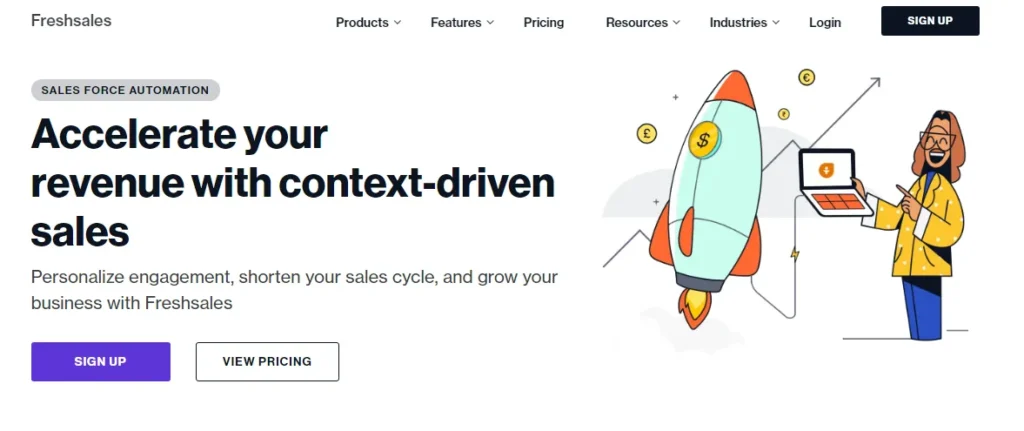
Freshsales is a CRM software option that is designed specifically for small and medium-sized businesses.
It offers a range of features and tools to help businesses manage their customer relationships, including contact and lead management, sales forecasting, and marketing automation.
Benefits of using Freshsales
- Offers a range of features and tools to help businesses manage customer relationships and improve sales and marketing efforts.
- Affordable pricing options for small and medium-sized businesses.
- Easy to use and navigate.
Pros
- Affordable pricing options for small and medium-sized businesses.
- Intuitive and easy to use.
- Offers a range of features and tools to help businesses manage customer relationships and improve sales and marketing efforts.
Cons
- Limited in terms of advanced features and customization options compared to other CRM software options.
- May not be suitable for larger businesses with more complex needs.
Getting started with Freshsales
- Sign up for a free trial to get a feel for the platform and its features.
- Consider hiring a Freshsales partner to help you set up and customize the software for your specific business needs.
- Take advantage of Freshsales’ resources, including training materials and customer support, to ensure a smooth implementation process.
11. Quickbase
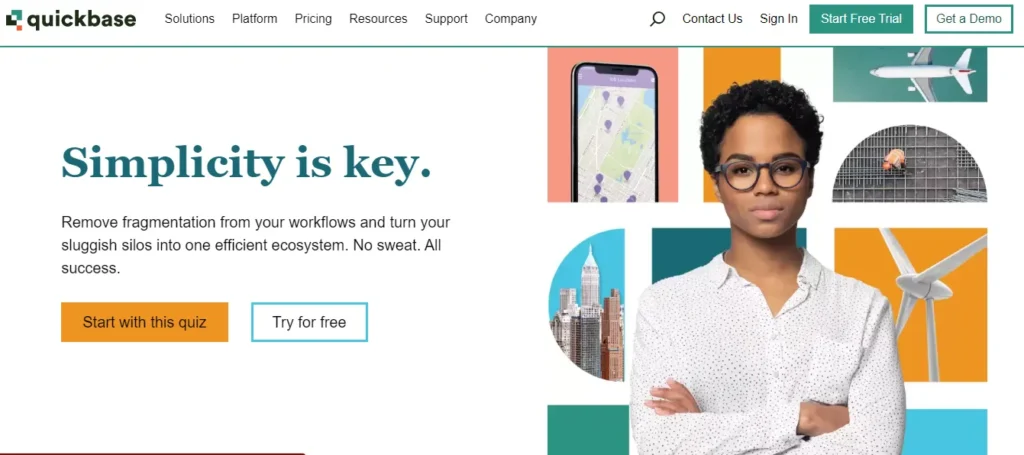
Quickbase is a CRM software option that is designed specifically for small and medium-sized businesses.
- It offers a range of features and tools to help businesses manage their customer relationships, including contact and lead management, sales forecasting, and marketing automation..
Benefits of using Quickbase
- Offers a range of features and tools to help businesses manage customer relationships and improve sales and marketing efforts.
- Affordable pricing options for small and medium-sized businesses.
- Easy to use and navigate.
Pros
- Affordable pricing options for small and medium-sized businesses.
- Intuitive and easy to use.
- Offers a range of features and tools to help businesses manage customer relationships and improve sales and marketing efforts.
Cons
- Limited in terms of advanced features and customization options compared to other CRM software options.
- May not be suitable for larger businesses with more complex needs.
Getting started with Quickbase
- Sign up for a free trial to get a feel for the platform and its features.
- Consider hiring a Quickbase partner to help you set up and customize the software for your specific business needs.
- Take advantage of Quickbase’s resources, including training materials and customer support, to ensure a smooth implementation process.
12. Sage CRM
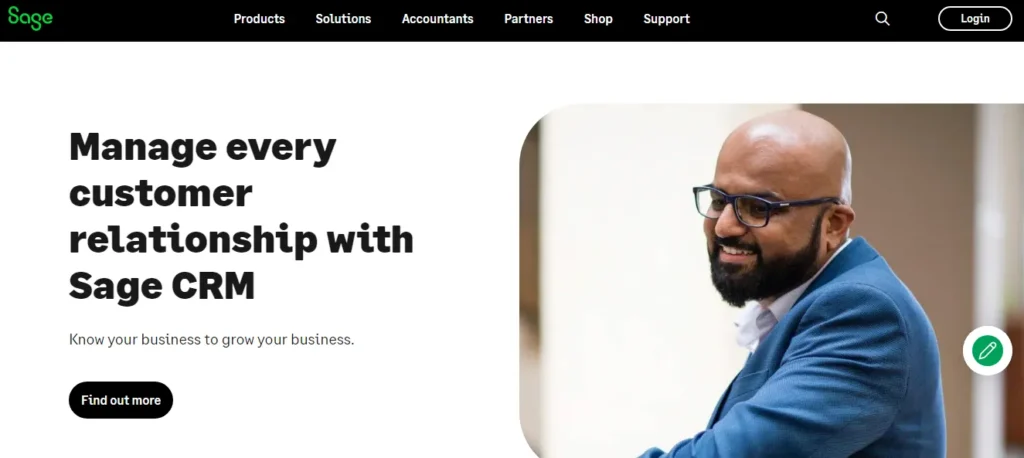
Sage CRM is a comprehensive CRM software option that is suitable for businesses of all sizes.
It offers a range of features and tools to help businesses manage their customer relationships, including contact and lead management, sales forecasting, and marketing automation. It also integrates with a wide range of third-party apps and tools.
Benefits of using Sage CRM
- Offers a range of features and tools to help businesses manage customer relationships and improve sales and marketing efforts.
- Integrates with a wide range of third-party apps and tools.
- Offers robust analytics and reporting capabilities to help businesses make informed decisions.
- Scalable to fit the needs of businesses of all sizes.
Pros
- Wide range of features and customization options.
- Integrates with a wide range of third-party apps and tools.
- Scalable to fit the needs of businesses of all sizes.
- Excellent customer support.
Cons
- Can be complex and overwhelming for small businesses or those new to CRM software.
- Pricing may be expensive for some businesses.
Getting started with Sage CRM
- Sign up for a free trial to get a feel for the platform and its features.
- Consider hiring a Sage partner to help you set up and customize the software for your specific business needs.
- Take advantage of Sage’s extensive resources, including training materials, user guides, and customer support, to ensure a smooth implementation process.
13. Insightly
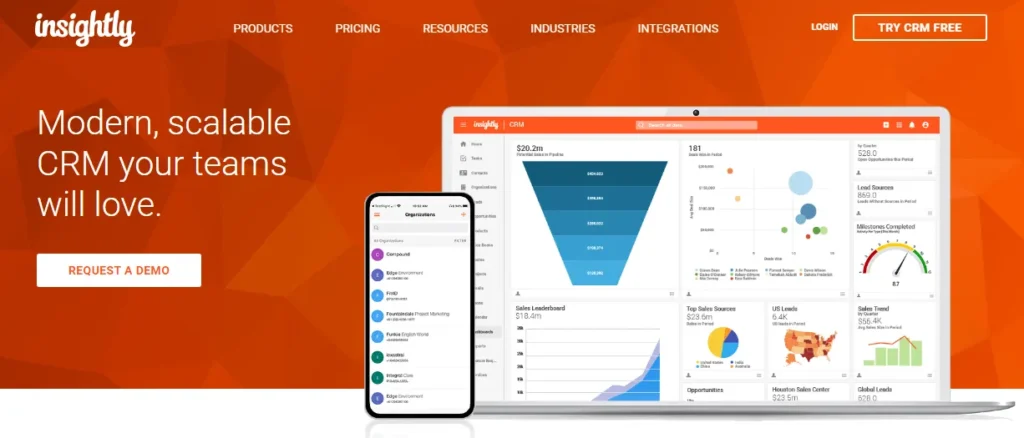
Insightly is a CRM software option that is designed specifically for small and medium-sized businesses.
It offers a range of features and tools to help businesses manage their customer relationships, including contact and lead management, sales forecasting, and marketing automation.
Benefits of using Insightly
- Offers a range of features and tools to help businesses manage customer relationships and improve sales and marketing efforts.
- Affordable pricing options for small and medium-sized businesses.
- Easy to use and navigate.
Pros
- Affordable pricing options for small and medium-sized businesses.
- Intuitive and easy to use.
- Offers a range of features and tools to help businesses manage customer relationships and improve sales and marketing efforts.
Cons
- Limited in terms of advanced features and customization options compared to other CRM software options.
- May not be suitable for larger businesses with more complex needs.
Getting started with Insightly
- Sign up for a free trial to get a feel for the platform and its features.
- Consider hiring an Insightly partner to help you set up and customize the software for your specific business needs.
- Take advantage of Insightly’s resources, including training materials and customer support, to ensure a smooth implementation process.
14. SugarCRM
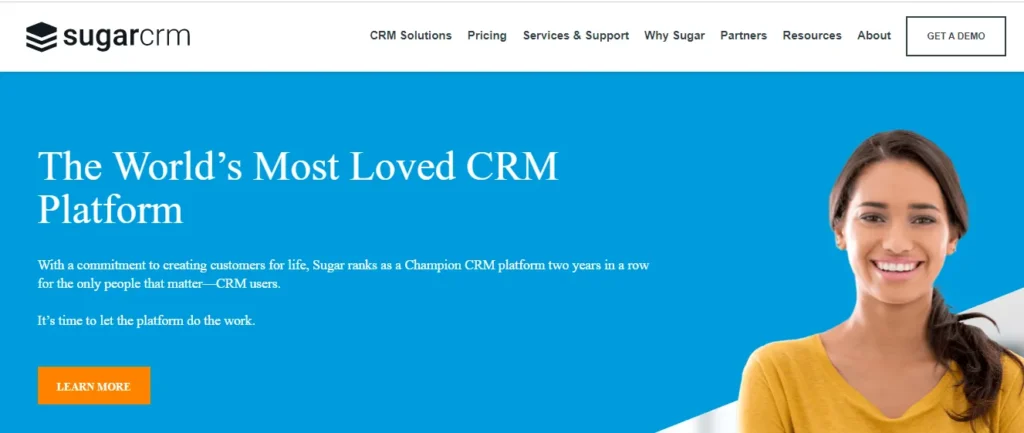
SugarCRM is a comprehensive CRM software option that is suitable for businesses of all sizes.
It offers a range of features and tools to help businesses manage their customer relationships, including contact and lead management, sales forecasting, and marketing automation. It also integrates with a wide range of third-party apps and tools.
Benefits of using SugarCRM
- Offers a range of features and tools to help businesses manage customer relationships and improve sales and marketing efforts.
- Integrates with a wide range of third-party apps and tools.
- Offers robust analytics and reporting capabilities to help businesses make informed decisions.
- Scalable to fit the needs of businesses of all sizes.
Pros
- Wide range of features and customization options.
- Integrates with a wide range of third-party apps and tools.
- Scalable to fit the needs of businesses of all sizes.
- Excellent customer support.
Cons
- Can be complex and overwhelming for small businesses or those new to CRM software.
- Pricing may be expensive for some businesses.
Getting started with SugarCRM
- Sign up for a free trial to get a feel for the platform and its features.
- Consider hiring a SugarCRM partner to help you set up and customize the software for your specific business needs.
- Take advantage of SugarCRM’s extensive resources, including training materials, user guides, and customer support, to ensure a smooth implementation process.
…
What are some common features of CRM software?
Some common features of CRM software include:
Contact and lead management
Allows businesses to track and manage customer and prospect data, including contact information and communication history.
Sales forecasting
Helps businesses track and predict sales performance and forecast future sales.
Marketing automation
Allows businesses to automate marketing tasks and campaigns, such as email marketing and social media marketing.
Customer support
Helps businesses manage customer inquiries and support requests, including tracking and resolving issues.
Analytics and Reporting
Provides businesses with data and insights to help inform decision-making and track performance.
Frequently Asked Questions About CRM Software:
CRM software is used to manage customer relationships and interactions throughout the customer lifecycle. It helps businesses track and manage customer data, including contact information, sales and marketing efforts, and customer support. CRM software can also help businesses improve sales and marketing efforts and streamline business processes.
CRM software can benefit businesses in a number of ways, including:
Improved customer relationships: By tracking and managing customer data and interactions, businesses can better understand their customers’ needs and preferences, leading to improved customer relationships and satisfaction.
Increased sales: By tracking and managing leads and sales opportunities, businesses can improve their sales efforts and close more deals.
Streamlined business processes: By centralizing customer data and automating tasks and processes, businesses can save time and improve efficiency. Improved decision-making: By tracking and analyzing customer data, businesses can gain valuable insights that can help inform strategic decision-making.
The cost of CRM software can vary widely depending on the specific software options and features that a business chooses.
Some CRM software options offer free, basic versions that can be upgraded as needed, while others have more expensive pricing plans that may be more suitable for larger businesses with more complex needs. It’s important to carefully consider your business’s needs and budget when choosing a CRM software solution.
Conclusion
CRM software is a powerful tool that can help businesses of all sizes manage their customer relationships and improve sales and marketing efforts.
While there are many CRM software options available on the market, some of the best options include Salesforce CRM, HubSpot CRM, Zoho CRM, and Microsoft Dynamics CRM.
Each of these options offers a range of features and tools to help businesses manage customer relationships, improve sales and marketing efforts, and streamline business processes.
When choosing a CRM software solution, it’s important to carefully consider your business’s needs and budget, as well as the pros and cons of each option.
By implementing a CRM system, businesses can improve customer relationships, increase sales, and streamline business processes to drive growth and success.

